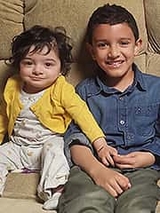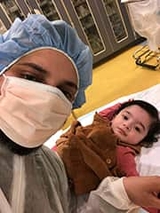Neuropathic Intestinal Dysmotility: Liyana’s Story
Neuropathic Intestinal Dysmotility: Liyana’s Story
Liyana had a rough start in life with multiple, complex gastrointestinal issues. Thanks to expert care from a team of GI motility specialists at Children’s Hospital of Philadelphia, the toddler has made tremendous progress. Today, treatments at CHOP are improving Liyana’s day-to-day quality of life, helping her grow and develop, and giving her family renewed hope to her future.

Liyana was born at 27-weeks’ gestation in a New Jersey hospital. She was small – less than 2 lbs. at birth – but healthy, at least at first. After one month, Liyana developed a serious intestinal infection known as necrotizing enterocolitis (NEC).
To treat her condition, she underwent multiple abdominal surgeries over the next few months, including the removal of part of her small intestine, an ileostomy (a procedure that creates an external opening for waste to pass through), and eventually, a reversal of the ileostomy.
While the ileostomy was in place, Liyana had started growing well. Once it was reversed, however, she began vomiting – virtually non-stop and her doctors weren’t entirely sure why. In addition to Liyana’s obvious discomfort, her growth stalled.
“She was taking in food, but then she’d vomit it right back up,” says her mom, Nida. “Her body just didn’t have time to process the nutrients it needed to grow.”
Nida and her husband Ayaz had Liyana transferred to a second hospital in New York, where the baby received a feeding tube, yet still struggled to keep food down. Liyana was diagnosed with failure to thrive. “She was so underweight, she wasn’t even on the growth charts,” Ayaz recalls.
At this point, Liyana had spent the first seven months of her life in the NICU, undergone several surgeries and was still struggling. Her parents consulted with her care team to find out what other medical options might give their daughter a better quality of life.
New treatments — and cause for hope

“Eventually, her team realized that the complexity of her condition meant she needed to be seen by a specialist, and they referred us to CHOP,” Ayaz says.
“CHOP had been on our radar as an option, but it was still a little scary,” he adds. “This would be our third hospital. We kept thinking this was the surgery or the medication that would fix it and it never was. It was hard to put a lot of faith into a new place.”
Liyana first came to CHOP shortly before her first birthday and the family met with Hayat Mousa, MD, director of the Suzi and Scott Lustgarten GI Motility Center and world-renowned expert in pediatric gastrointestinal motility disorders. They also met with Joshua Eisenberg, MD, then-fellow, previously an attending physician in the Division of Gastroenterology, Hepatology and Nutrition at CHOP.
Dr. Mousa and Dr. Eisenberg performed advanced diagnostic testing for Liyana – including antroduodenal manometry – to better understand the function of nerves and muscles in Liyana’s stomach and small intestine. Dr. Mousa discovered Liyana’s peristalsis (the involuntary constriction and relaxation of muscles in the intestines) was weak and not well coordinated — essentially, her intestines were ineffective at moving food through her digestive tract properly. Dr. Mousa developed a specific medication regimen to cut down on Liyana’s frequent vomiting.
When prescribing medication to address motility issues it can sometimes take months to see results, but Liyana has already made significant progress. Her vomiting has lessened, and she has begun to eat some solid foods (in addition to tube feeds) without vomiting.
“Liyana’s not ‘cured’ but I feel like we’re finally figuring out the right cocktail of meds,” Ayaz says. “She’s gained weight and is above the 5th percentile on the growth charts now, and still improving.”
Meeting new milestones
In the past few months, Liyana has started to walk, and is interacting more with her family and environment — including her older brother’s toys, to his mild annoyance, Nida says. Nida adds:
“When she hits a new milestone now, we get so excited because a few months ago it didn’t seem possible. There’s a light at the end of the tunnel now.”
As Liyana approaches her second birthday, her long-term prognosis is promising. However, bumps in the road are still expected. The family makes frequent trips to the CHOP Emergency Department – typically because her feeding tube has become dislodged, or she’s developed an infection. But now, the hospital trips are shorter and there’s less chance of being admitted.
Her parents understand that long-term medication management of her motility issues may not always be enough to keep her condition in check. While further surgeries are not planned at this time; they are still a possibility if needed.

Ayazcompares his daughter’s treatment to a game with multiple levels: “You get a set of instructions, you complete that level, and then there’s another level with new challenges,” he adds.
Nonetheless, Nida and Ayaz said their experience with CHOP has been positive and life-altering – for their daughter and themselves. They’re especially appreciative of the expertise, personal attention and responsiveness Dr. Mousa and her team have given them.
Ayaz says: “Motility issues are so complex, and it’s good to know that we can always reach someone on Dr. Mousa’s team who fully understands Liyana’s history.”